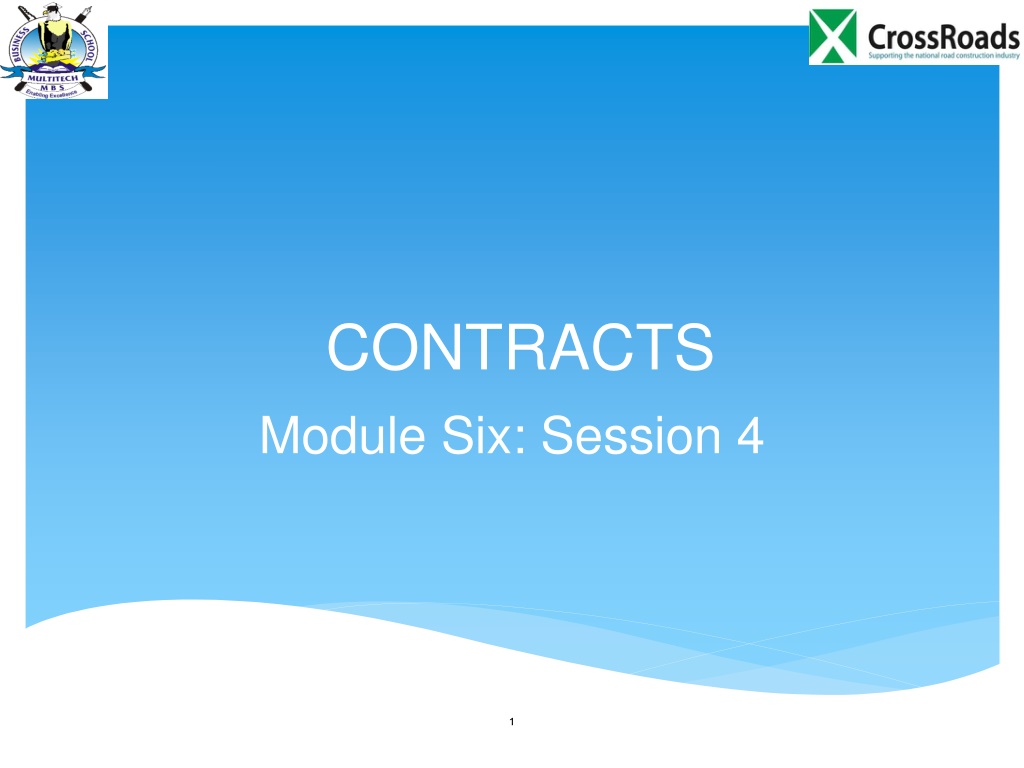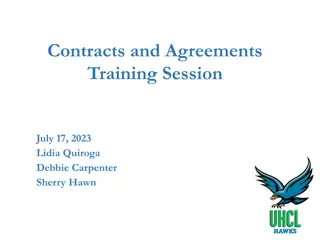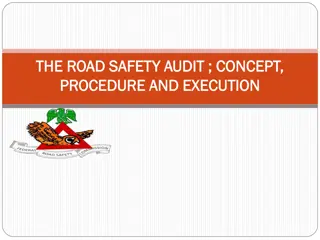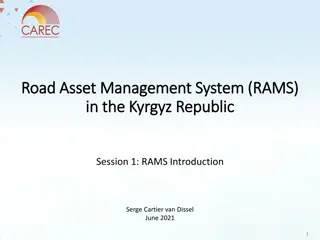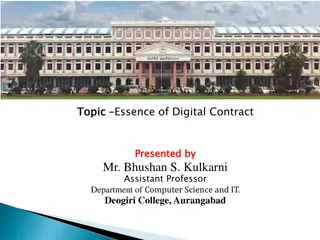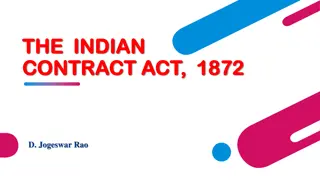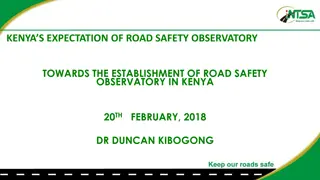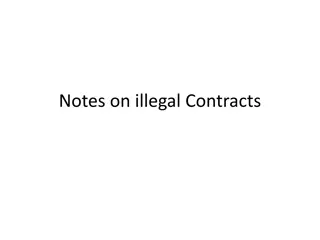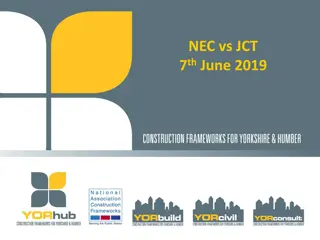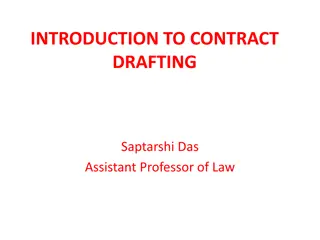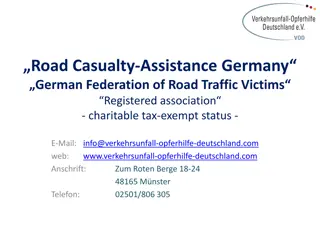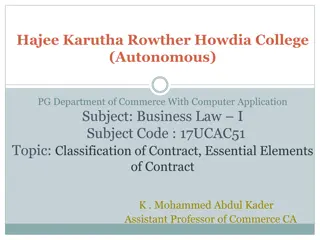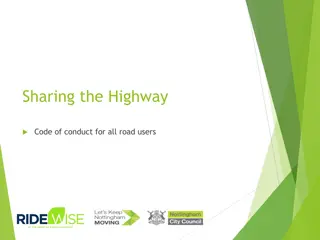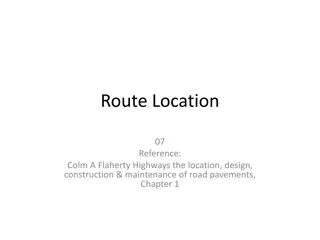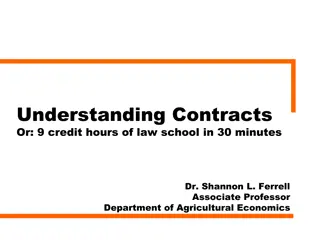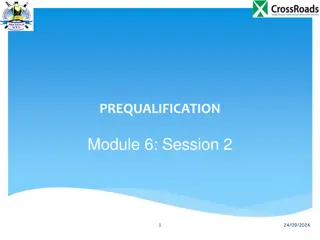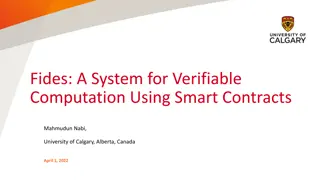Understanding Road Sector Contracts: Key Elements and Importance
Explore the concept and types of contracts in the road sector, key elements, importance of signed contracts, general and special conditions, and content of a typical contract. Learn about the procurement procedures, parties involved, agreement clauses, and documents forming a contract. Gain insights into the significance of specific clauses unique to road contracts.
Download Presentation

Please find below an Image/Link to download the presentation.
The content on the website is provided AS IS for your information and personal use only. It may not be sold, licensed, or shared on other websites without obtaining consent from the author. Download presentation by click this link. If you encounter any issues during the download, it is possible that the publisher has removed the file from their server.
E N D
Presentation Transcript
CONTRACTS Module Six: Session 4 1
Objectives of the Session 1) Appreciate the concept of contracts as it relates to the road sector 2) List and discuss the key elements of a contract 3) List the different types of contracts in the road sector 4) Explain the importance of having a signed contract 2 05/10/2024
Road Contracts Contract means an agreement between a PDE and a provider, Results from the application of the appropriate and approved procurement procedures, Concluded following a bid award decision of a Contracts Committee or any other appropriate authority. 3 05/10/2024
GENERAL CONDITIONS OF A CONTRACT - These unchanged provisions used without modifying their text such as: Scope and method of work for different works items such as shoulder grading, re-gravelling, premix pothole patching, repair of edges etc. Measurement of works and payment terms Definitions, interpretations and definition of risks etc. Time and quality control provisions Cost control and payment related provisions Completion, termination or take over of works etc.. contain standard provisions that remain 05/10/2024 4
SPECIAL CONDITIONS OF CONTRACT - These specify key clauses unique to the contract like: Commencement and completion dates Defects liability period Description of works Payment schedule and period Performance security etc.. 05/10/2024 5
CONTENT OF A CONTRACT Procurement reference Parties to the contract Agreement clause stating work and consideration Signature of employer and contractor Signature of witnesses for each Attachments that form part of the contract a) Clearance from Solicitor General b) Site visit certificate works program c) Contracts Committee Approval d) Letter of notification of award e) General and special contract terms etc. 05/10/2024 6
Contract Documents that normally form part of a contract The documents forming the Contract are interpreted in the following order of priority; a) Agreement, b) Letter of award notification and acceptance thereof, c) The Provider s Bid, as amended by any clarifications, negotiation. d) Special Conditions of Contract(SCC), e) General Conditions of Contract (GCC), f) Statement of Requirements, g) Any other document listed in the SCC as forming part of the Contract. (see slide 6) 7 05/10/2024
What constitutes a contract? Essential elements in a contract are: a) Intention to enter into a legally binding agreement. b) Agreement between parties (offer and acceptance). c) Consensus about the subject matter d) Both parties must provide a consideration. e) Parties must have legal capacity to contract. 8 05/10/2024
Types of Contracts a) Lump sum contract b) Time based contracts c) Ad measurement d) Framework Contracts e) Percentage Contracts f) Petty Contracts g) Cost Reimbursable contracts. h) Target Price Contracts i) Retainer Contracts. j) Contingency or Success Fee. k) A combination 9 05/10/2024
Lump sum contract This a contract with a pre agreed price for performance of the specified tasks. The amount of the price is based on the deliverables and is fixed. Such a contract passes the risk of the cost of works to the provider. An example is where a bidder contracts to grade a road at a fixed fee of xm shillings.
Time based contract A time based contract is one where the provider is remunerated on time taken to do a task. A rate is agreed but the time is uncertain It is common where the scope and duration of the works are difficult to ascertain It requires close supervision to ensure that work is going on when it should It is good when the provider is good, competent and ethical,
Ad measurement contract The unit rate is agreed for the tasks and measurements of tasks done over the period and paid for at the standard rate. Good where: works cannot be ascertained with accuracy, or is likely to have unforeseen works conditions, but where output is easily measurable. Costs remain uncontrollable and the risk of cost variation is born by the PDE, An example is excavation of soil/gravel
Percentage contract Remuneration to the provider is based on an agreed percentage to the cost incurred Eg a professional fee of 5% on cost. This work well where the contractor is experienced and cost cautious. It offers no incentive for the provider to save,
Framework contracts Apply to tasks that are recurring over a period of time. A unit rate is agreed for the tasks. The contract is valid for a period of time say three years. The provider is asked to carry out the contracted tasks as and when they are needed, value the work done and paid accordingly The practice saves time and money spent on repetitive procurements.
Factors considered in selecting contract type Nature of Procurement Minimisation of risk Value for money Cost control Organizational requirements 15 05/10/2024
Importance of a signed contract Documents a contractual relationship between a PDE and the contractor Makes obligations of each party clear Offers a basis of reference Provides specifications Defines basis of emoluments and payment terms Avoids conflict and facilitates arbitration
Q&A Session State core items you expect to be included in a road works contract Name and explain five common forms of works contract In order of preference what documents constitute a works contract? What legal and operational challenges have you experienced in execution of road works contracts? Name some of the events/omission during the procurement process that could lead to invalidate a contract between a PDE and a provider.
